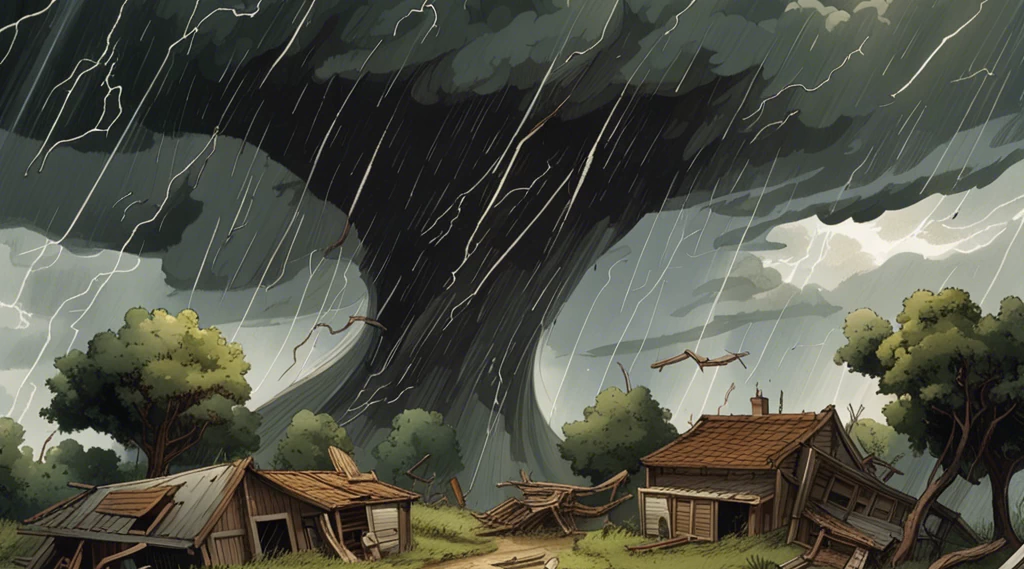Upheaval: Insights on Managing Turmoil
"Upheaval" by Jared Diamond explores the causes and potential solutions for societal crises by examining a range of historical case studies.
Chapter 1 What’s the Book Upheaval
"Upheaval" is a book written by Jared Diamond, an American geographer, historian, and author. The full title of the book is "Upheaval: Turning Points for Nations in Crisis." In this book, Diamond explores how nations have overcome crises throughout history and draws lessons from their experiences.
Diamond examines various case studies from different countries, including Finland, Japan, Chile, and Germany, among others. He analyzes these nations' responses to significant challenges such as war, political unrest, economic collapse, or natural disasters. By studying these examples, Diamond aims to identify common patterns and principles that can help nations successfully navigate periods of crisis.
The book looks at both historical and contemporary events, providing insights into how societies cope with change and transform themselves during times of upheaval. It explores factors such as national identity, leadership, institutions, and individual resilience, discussing how these elements influence a country's ability to adapt and recover.
Overall, "Upheaval" offers a deep dive into the dynamics of national crises and serves as a thought-provoking exploration of how nations can effectively manage and overcome challenging times.
Chapter 2 Why is Upheaval Worth Read
According to reddit comments on Upheaval, Upheaval by Jared Diamond is worth reading for several reasons:
- Insightful analysis: In Upheaval, Jared Diamond examines the causes and outcomes of various crises faced by nations throughout history. He provides a comprehensive analysis of these upheavals, exploring both their internal and external factors. His research delves into political, economic, social, and environmental aspects, offering deep insights into the forces that shape societies.
- Historical perspective: The book draws on numerous case studies from different parts of the world, spanning centuries of human history. By examining past upheavals such as Finland, Japan, Chile, and Germany, Diamond presents a historical perspective that helps us understand recurring patterns in national crises. This wide-ranging approach enhances our understanding of how societies respond to challenges.
- Lessons for the present and future: Upheaval offers valuable lessons for individuals, communities, and governments grappling with contemporary issues. Diamond explores how nations have dealt with their own crises and provides examples of successful approaches, as well as cautionary tales. These lessons can inform decision-making and help us navigate current challenges like climate change, political polarization, and economic instability.
- Engaging storytelling: As an accomplished writer, Diamond effectively combines rigorous research with compelling narratives. He weaves personal anecdotes, interviews, and historical accounts together, making *Upheaval* an engaging read. This storytelling approach ensures the information is accessible and enjoyable, even for readers who may not have a background in history or geopolitics.
- Practical application: Beyond gaining knowledge about historical events, Upheaval*encourages readers to apply its insights to their own lives. By using the "Twelve Factors" framework developed in the book, individuals can assess and improve their ability to navigate personal crises. This practical application adds a unique dimension to the book, making it relevant on a personal level.
Overall, Upheaval is worth reading for its thought-provoking analysis, historical perspective, practical application, engaging storytelling, and the important lessons it offers. Whether you are interested in history, international relations, or personal development, this book provides a rich and enlightening reading experience.
Chapter 3 Upheaval Summary
In this article, we delve into the thought-provoking insights presented in Jared Diamond's book titled "Upheaval." Unraveling the complexities of societal disruptions throughout history, Diamond examines how nations have coped with and overcome various upheavals. By analyzing case studies from different regions, he uncovers invaluable lessons about resilience, adaptation, and the crucial factors that determine a society's destiny. Join us on a journey through time as we explore the challenges faced by societies and the remarkable ways they have risen above adversity.
Chapter 4 Upheaval Author
The book titled "Upheaval" is written by Jared Diamond, a renowned American author, geographer, and historian. He authored this book in 2019.
Jared Diamond has written several other influential books throughout his career. Some of his notable works include:
- "Guns, Germs, and Steel: The Fates of Human Societies" (1997): This book explores the broad patterns of history and investigates why certain civilizations have thrived while others have faltered. It won the Pulitzer Prize for General Nonfiction in 1998 and remains one of Diamond's most acclaimed works.
- "Collapse: How Societies Choose to Fail or Succeed" (2005): In this book, Diamond examines historical examples of societal collapse, exploring the factors that contributed to their downfall. He also highlights potential solutions and lessons for avoiding future catastrophes.
- "The World Until Yesterday: What Can We Learn from Traditional Societies?" (2012): Here, Diamond draws on his experiences with traditional societies to contrast them with modern practices, examining what we can learn from their knowledge, lifestyles, and social structures.
In terms of editions, it is subjective to determine which book by Jared Diamond is the best. However, "Guns, Germs, and Steel" has gained significant popularity and acclaim since its publication, making it widely regarded as one of his most influential works.
Chapter 5 Upheaval Meaning & Theme
1. Upheaval Meaning
The book "Upheaval: How Nations Cope with Crisis and Change" by Jared Diamond explores the historical and contemporary challenges faced by nations during times of crisis and change. In this book, Diamond draws upon his extensive knowledge of history, geography, and anthropology to analyze how nations have responded to major crises in the past.
Diamond examines a range of case studies from different parts of the world, including Finland, Japan, Chile, Germany, and Australia, among others. By analyzing these examples, he identifies common patterns and factors that contribute to a nation's ability to successfully navigate through upheaval and emerge stronger.
The central theme of the book revolves around how nations confront and overcome significant challenges such as economic downturns, political turmoil, social unrest, and natural disasters. Diamond explores various factors that influence a nation's resilience and adaptability, including national identity, leadership, institutions, cultural values, and the ability to learn from both domestic and international experiences.
Through his research, Diamond aims to provide insights into how societies can cope with crises and embrace change. He offers lessons and strategies for individuals, communities, and policymakers to better understand and respond to turbulent times.
Overall, "Upheaval" seeks to uncover the nuanced dynamics behind successful management of crises and provides readers with a deeper understanding of the complex factors that shape a nation's ability to overcome challenges and thrive in the face of adversity.
2. Upheaval Theme
The book "Upheaval: Turning Points for Nations in Crisis" by Jared Diamond explores the theme of societal resilience and how nations navigate through periods of significant challenges or crises. Diamond examines historical case studies from different countries, highlighting moments of upheaval such as wars, political revolutions, economic collapse, and natural disasters.
One prominent theme in the book is the importance of national self-reflection and the willingness to adapt in the face of adversity. Diamond argues that nations can learn valuable lessons from their past experiences and use them as a foundation for positive change. By analyzing the responses of various countries to their respective crises, he emphasizes the role of national introspection, self-appraisal, and collective decision-making in facilitating successful transformations.
Another central theme is the exploration of factors that contribute to a nation's ability to survive and thrive during times of turmoil. Diamond identifies twelve potential factors that often influence outcomes, including national identity, effective leadership, realistic appraisal of one's own situation, and capacity for honest national dialogue. Through these case studies, Diamond seeks to provide insights into what separates resilient nations from those that fail to overcome their challenges.
Moreover, the book delves into the concept of individual responsibility within a broader societal context. Diamond highlights the importance of individuals taking personal responsibility and making sacrifices for the greater good of their nation. He explores how both leaders and ordinary citizens play crucial roles in shaping the trajectory of their countries during times of crisis.
Overall, the underlying theme of "Upheaval" revolves around understanding how nations confront and navigate through moments of significant upheaval. It explores the dynamics of resilience, adaptation, and transformation, aiming to provide insights into how societies can respond constructively to adversity and create a more prosperous future.
Chapter 6 Surveying Online Content about Upheaval
If you are looking for a range of formats and concise summaries of Upheaval, we suggest checking out platforms like Bookey. They offer an extensive collection of books in various formats, accompanied by short summaries that give you a quick glimpse into the content of each book. This proves particularly advantageous for those seeking a comprehensive overview without investing too much time. If your preference leans towards reading the complete book and you enjoy the physicality of a printed copy, we highly recommend exploring Amazon. There, you will discover a vast selection of physical books covering Upheaval, along with supplementary works like "動盪:國家如何化解危局、成功轉型?: Upheaval: Turning Points of Nations in Crisis (Traditional Chinese Edition)", which delve deeper into the subject matter and provide more detailed and informative content. However, we regret to inform you that a PDF version of Upheaval is not available directly in this post, as our primary objective is to introduce the value of the book and present you with alternative reading options. We sincerely hope these recommendations assist you in finding the perfect reading experience.
Happy reading!
Chapter 7 Upheaval Quotes
Upheaval quotes as follow:
- "History followed different courses for different peoples because of differences among people's environments, not because of biologically-based differences among peoples themselves."
- This quote highlights the author's emphasis on environmental factors as a major determinant of historical outcomes.
- "It’s easier to find God in a moment of crisis than in moments of comfort."
- This quote reflects how people often turn to spirituality or seek answers during times of upheaval and uncertainty.
- "The ideal societal response is neither to suppress trauma nor to let it run its course unchecked, but rather to harness the energy of trauma and channel it for constructive purposes."
- Here, Diamond suggests that societies should acknowledge trauma and use it as a catalyst for positive change.
- "We have met problems like this before and have usually solved them, often through painful compromise."
- This quote acknowledges that addressing challenges requires compromise and learning from past experiences.
- "National crises tend on average to get resolved sooner if there is open discussion about them."
- Diamond emphasizes the importance of open dialogue and transparency when it comes to resolving national crises.
Please note that these quotes are attributed to Jared Diamond's book "Upheaval," but specific page numbers or context may vary.
Chapter 8 Books Like Upheaval
If you enjoyed reading "Upheaval" by Jared Diamond, you might find the following books interesting:
- "Sapiens: A Brief History of Humankind" by Yuval Noah Harari: This book explores the history of our species, covering various aspects of human development and societal changes. It provides a thought-provoking perspective on the forces that have shaped our world.
- "Guns, Germs, and Steel: The Fates of Human Societies" by Jared Diamond: If you haven't already read this book by the same author, it offers a fascinating examination of how geographic and environmental factors influenced the rise and fall of civilizations throughout history.
- "Collapse: How Societies Choose to Fail or Succeed" by Jared Diamond: Another book by Jared Diamond, "Collapse" delves into the reasons behind societal collapses throughout history, identifying common pitfalls and lessons we can learn to avoid them.
- "The Better Angels of Our Nature: Why Violence Has Declined" by Steven Pinker: In this book, Pinker argues that violence has decreased over time and provides evidence to support his claims. It offers an optimistic look at humanity's progress and explores the factors that have contributed to this decline.
- "The Silk Roads: A New History of the World" by Peter Frankopan: This book presents a global history through the lens of the ancient trade routes known as the Silk Roads. It portrays the interconnectedness of civilizations and highlights the role of trade in shaping societies.
- "A Short History of Nearly Everything" by Bill Bryson: Bryson takes readers on a journey through scientific history, making complex concepts accessible and engaging. This book covers a wide range of topics, including geology, chemistry, biology, and cosmology.
Remember, while these books share similarities with "Upheaval," each offers its own unique perspective on historical events, societal changes, or human development. Enjoy exploring these books and discovering new insights!





